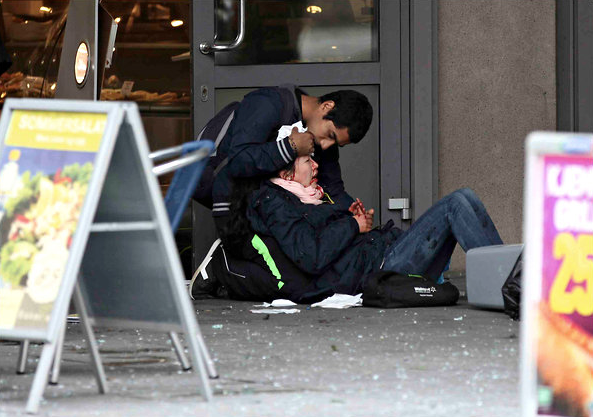This photograph won’t win any awards, but it tells an important story. A story within a story, to be exact.
The larger story is that a terrorist attacked both a government center and a civics camp in Norway, killing at least 72 people. That story includes all the madness you might expect. The attacker wanted to protect Europeans, so he murdered Europeans. To oppose Islamic groups advocating authoritarian rule to enforce cultural conservatism, he called for an authoritarian takeover of European governments to enforce cultural conservatism. He got as far as he did by exploiting the freedom and social trust that he deplored.
Sadly, we know that story all too well. It also is a story of how ordinary precautions didn’t work, how the state does not maintain a monopoly on violence, and how even advanced societies are sure to fail. Which is why the smaller story is so important. The photograph captures what can happen in the aftermath of system failure. One person is comforting another who has been wounded by the blast in Oslo. She appears to have a head wound, and he is responding appropriately by applying a compress while keeping her head elevated. His posture can’t be comfortable, as he is on his knees while supporting and steadying her body. Equally important, he is comforting her: holding her closely, talking and listening, being deeply attentive to her person despite all the mayhem surrounding them.
The scene is a moment of civic intimacy. They are framed by the ordinary decor of the city street: pavement, a metal and glass door, the signage, chair, and trash bin of a cafe, yet they are closely attuned to one another. Nor is this a merely personal incident, as we can see from the shattered glass strewn across the sidewalk. She hasn’t simply fainted or had a seizure, and the person helping her may not have known her at all–the caption identified him as a “passer-by.” They were strangers who have been thrown together by the blast–and his kindness.
His action is underscored by their ambiguous ethnicity. Is he Norwegian? Is she? Could he be one of those dreaded Islamic immigrants? Fascist ethnic typing is scrambled by this act of compassionate citizenship. For whatever passports they might have, he has made both of them citizens: strangers having obligations of equality and assistance regardless of other differences. As Ariela Azoulay argues, any photograph implies that relationship; here the citizenship conferred by the camera reinforces what is already evident on the street.
The Chicago Tribune’s report on the attack was on page 26 of the Sunday edition. I can’t believe that the story of a fundamentalist killing 72 people in a European country would have been buried had the attacker not been Christian and blond. (Don’t like the Christian label? Then stop labeling Middle Eastern terrorists “Muslim.”) The Tribune is another example of system failure–in this case, the way the story will be underplayed in most of the American media.
Fortunately, as important as institutions are, we don’t have to rely on them alone. Disasters demonstrate again and again that, amidst large-scale disruption, small-scale action by ordinary citizens is vitally important to limiting damage and restoring order. The photograph above is one example of true citizenship. More will be needed, and in response to disasters ranging from terrorist attacks to economic catastrophes.
Photograph by Scanpix/Reuters.

[…] Civic intimacy# The larger story is that a terrorist attacked both a government center and a civics camp in Norway, killing at least 72 people. That story includes all the madness you might expect. The attacker wanted to protect Europeans, so he murdered Europeans. To oppose Islamic groups advocating authoritarian rule to enforce cultural conservatism, he called for an authoritarian takeover of European governments to enforce cultural conservatism. He got as far as he did by exploiting the freedom and social trust that he deplored. […]
‘ Citizen Action When Systems Fail ‘ reminds me so much of Seth’s recent posting, “No such thing as business ethics.” Just change “business” and “corporate”:
I worry that we absolve ourselves of responsibility when we talk about business ethics and corporate social responsibility. Corporations are collections of people, and we ought to insist that those people (that would be us) do the right thing. Business is too powerful for us to leave our humanity at the door of the office. It’s not business, it’s personal.
Full Text: http://sethgodin.typepad.com/seths_blog/2011/07/no-such-thing-as-business-ethics.html?utm_source=feedburner&utm_medium=feed&utm_campaign=Feed%3A+typepad%2Fsethsmainblog+%28Seth%27s+Blog%29